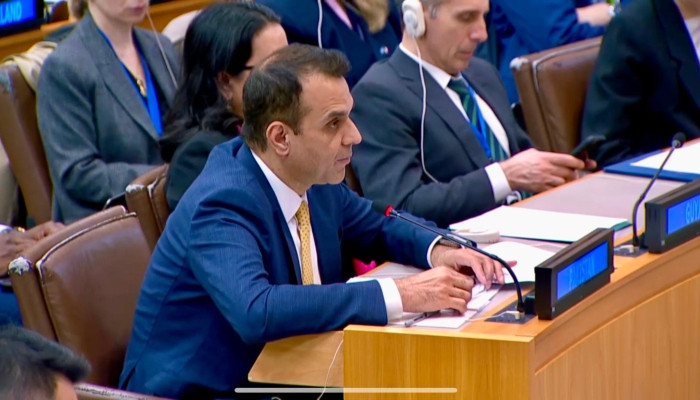Pakistani Diplomat Accuses India of Obstructing Water Flow at UN
UNITED NATIONS: A high-ranking Pakistani diplomat has criticized India’s alleged attempts to hinder the water flow guaranteed to Pakistan under the Indus Water Treaty of 1960, branding them as “malevolent designs.” He urged New Delhi to cease any actions that would halt, divert, or restrict the downstream flow of rivers.
“We will firmly oppose any such measures,” stated Ambassador Usman Jadoon, Pakistan’s Deputy Permanent Representative to the UN, during the United Nations Security Council (UNSC)’s Arria Formula Meeting on ‘Protecting Water in Armed Conflict,’ highlighting India’s purported strategy of weaponizing water resources.
Arria Formula meetings provide a platform for Security Council members to engage in candid and private discussions on pertinent issues.
The session, focusing on safeguarding water during armed conflicts, was organized by Slovenia in partnership with Algeria, Panama, Sierra Leone, and the Global Alliance to Spare Water from Armed Conflicts.
Slovenia’s State Secretary, Melita Gabric, opened the discussion by underscoring the vital importance of protecting water and associated infrastructure during armed conflicts to ensure the safety of civilians, asserting that “Protection of civilians and civilian objects under international humanitarian law is non-negotiable.”
The UNSC forum addressed the protection of water infrastructure in light of reported threats from New Delhi to curtail Islamabad’s water supply. Following an attack in Indian Illegally Occupied Jammu and Kashmir (IIOJK), blamed on Islamabad, New Delhi reportedly suspended its participation in the Indus Waters Treaty of 1960.
Pakistan has refuted any involvement in the aforementioned incident. Despite a ceasefire agreement between the two nations earlier in the month, the accord remains suspended.
The Pakistani envoy emphasized that assaults on water resources and infrastructure, along with the denial of access to these resources, constitute a clear violation of established norms and principles. He noted that the UNSC has consistently condemned the unlawful denial of access to essential resources for civilian survival.
“India’s choice to unlawfully and unilaterally suspend the 1960 Indus Waters Treaty (IWT), with the intention of impeding the flow of water guaranteed to Pakistan under the Treaty, represents a serious breach of international law, encompassing human rights law, treaty law, and customary international law,” Ambassador Jadoon asserted.
“Disturbing statements by Indian officials suggesting a desire to ‘starve the people of Pakistan’ reflect a deeply concerning and distorted mindset,” he added.
“We firmly condemn India’s illegitimate announcement to hold the Treaty in abeyance and implore India to rigorously adhere to its legal responsibilities and abstain from halting, diverting, or restricting rivers that serve as a lifeline for Pakistan’s population of 240 million.”
He appealed to the UNSC to proactively identify situations where violations of international law, including International Humanitarian Law (IHL), could compromise peace and security or precipitate a severe humanitarian crisis.
Concluding his remarks, Ambassador Jadoon voiced his support for the strict observance of IHL and international human rights laws, particularly concerning the protection of water resources and associated infrastructure.



Comments (0)
No comments yet. Be the first to comment!
Leave a Comment